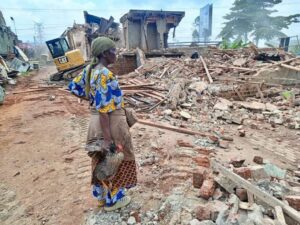From Landlords To Homeless: Evicted Residents Of Nansana Tell Their Stories Of Agony
 Community leaders in Nansana-Ganda, Wakiso district estimate roughly, 600 houses were demolished, leaving families displaced and seeking shelter from recent rains in makeshift structures.
Community leaders in Nansana-Ganda, Wakiso district estimate roughly, 600 houses were demolished, leaving families displaced and seeking shelter from recent rains in makeshift structures.
This followed a massive forced eviction by the National Environmental Management Authority (NEMA) in what was widely termed as an enforcement action against alleged encroachment on the Lubigi wetland.
We reached out to some of the victims of NEMA’s demolition spree, and here are their voices of anguish;
“I have lived here since 1960. I recently had a fourth medical surgery that almost took my life. Where should I go from here?” Margret Namakula, an 80-year-old resident of Nansana-Jenina in Wakiso district, expressed her displeasure at NEMA for its action.
Ruth Namuddu, who separated from her husband a couple of years ago after the unnamed dispute, explained, “my husband bought this land in 1993 and we built our house in 1995. When we finished building, we started living here. When we got misunderstanding with my husband, we separated, but he could often visit us.”
She added that to survive without sustainable support from her husband, she resolved to “approach BRAC where I obtained a loan and put up rentals so I could get a livelihood.”
What pains her most is NEMA’s failure to notify them before the demolition exercise, which caused her to lose everything including “my chicken.”
John Sserugo, a hawker, shared his losses after his home which he said constructed 20 years ago, was razed down.
“I save that money through the pain of fasting to be able to get my own home because I was tired of renting, but just like that, I am now back to square zero!”
He explained, “the old man who sold me the land has since died, but his children are alive and can confirm the sale.”
Hadijah Najjemba, a 95-year-old woman said that she started living on what is said to be a wetland in 1941 with her deceased husband Yusuf Ssentamu in 1941.
“We were born here, grew up here, and married while here! Our children have also married here and from this land. The wetland only became clogged due to deposits from government developments such as Nothern Bypass, Najjemba’s son explained on his ailing mother’s behalf.
John Kateregga, is another evictee-but said that he is considering returning to his ancestral home because urban life turned harder for him.
Hakim Mugenyi, a mechanic, expressed concern after losing his workplace due to the evictions.
He underscored the impact on his family’s livelihood, explaining, “this was my only source of income and being evicted is a big blow to the family I am looking after.”
NEMA’s enforcement eviction is part of the broader effort to reclaim the Lubigi wetland, which has been subject to human encroachment.
However, the abrupt evictions rendered many residents uncertain of what their future hold, thus arguing government to make interventions aimed at finding alternative solutions to their current homelessness.
